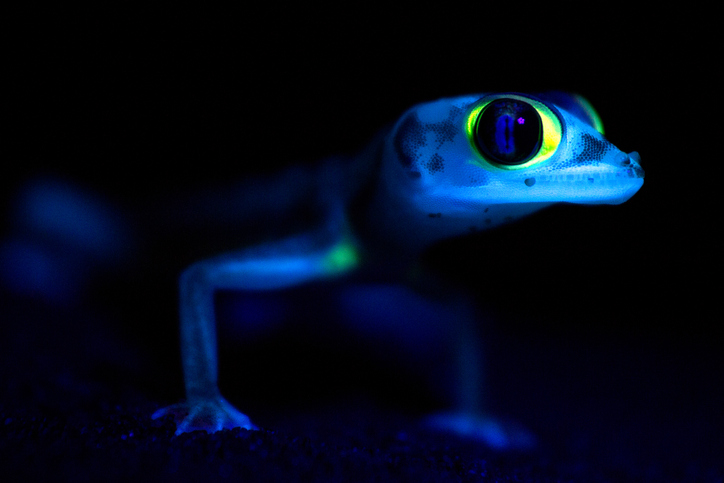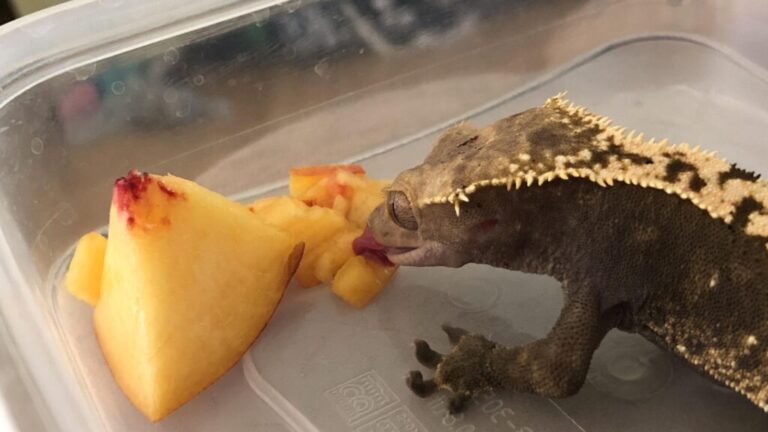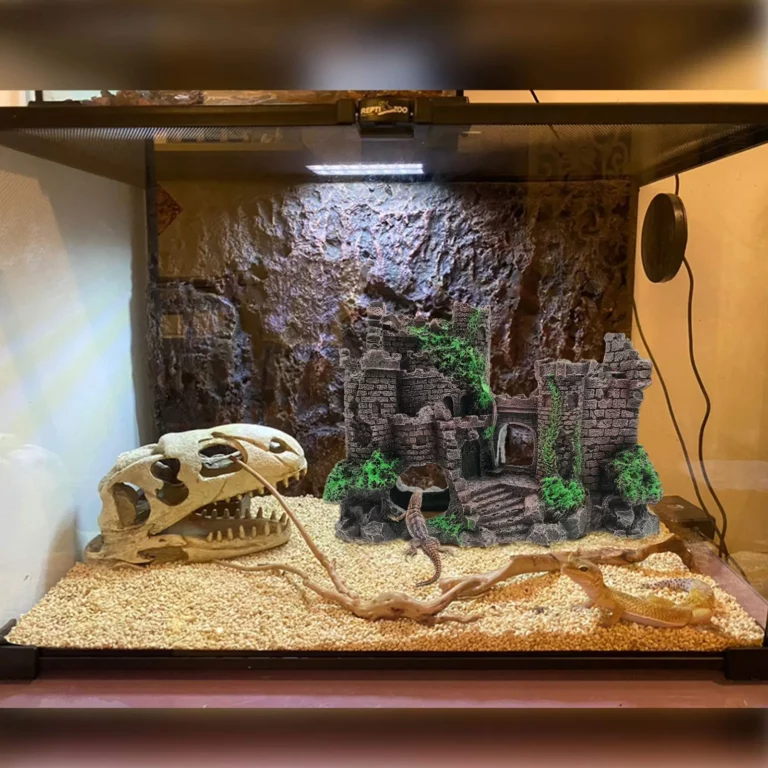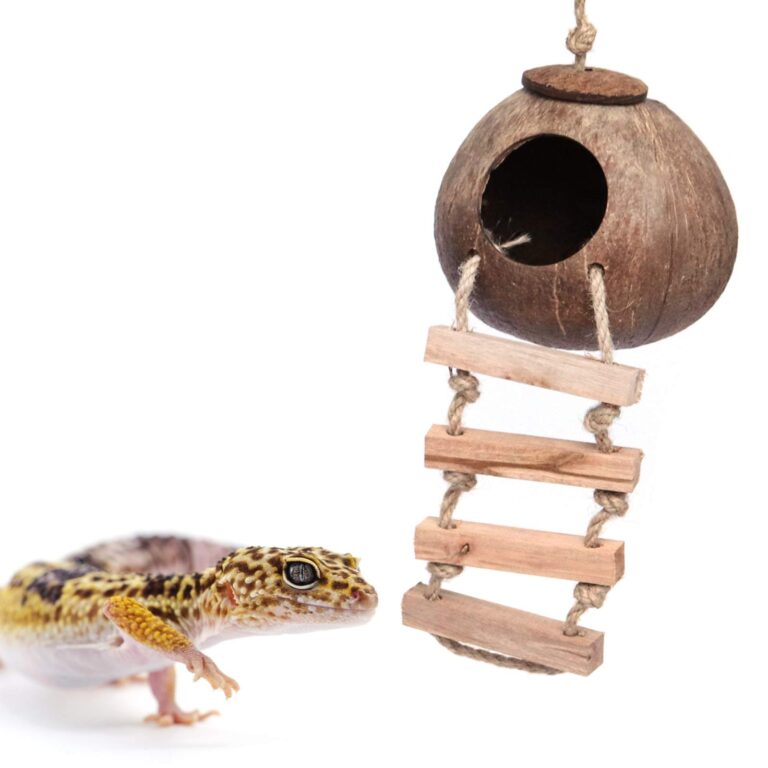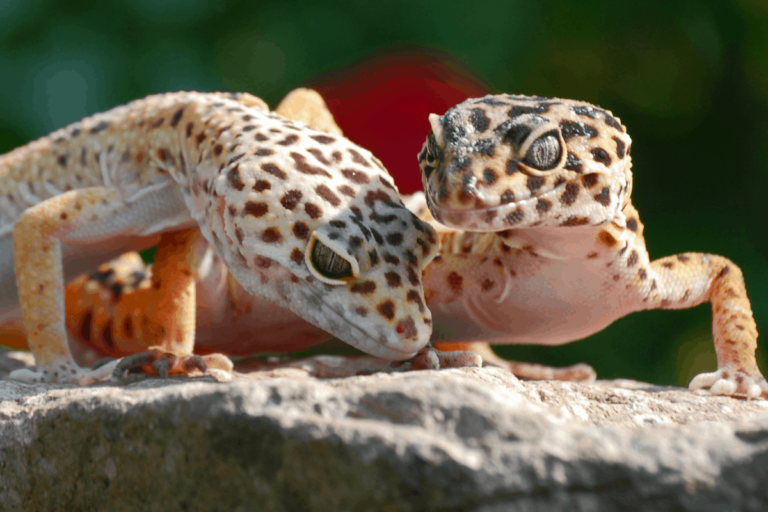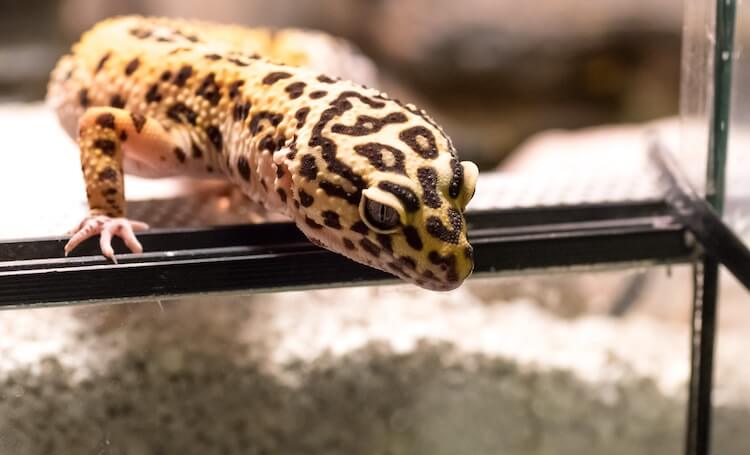Can Geckos See In The Dark? The Mysteries Of Night Vision
As I stood on the lush, moonlit balcony of my tropical getaway, I couldn’t help but wonder about the mesmerizing creatures that called this exotic paradise home. The whispering leaves and the faint rustling of nocturnal creatures provided the perfect backdrop for my late-night contemplations. And among all the intriguing creatures, my mind couldn’t escape the enigmatic world of geckos and their alleged ability to see in the dark.
In the depths of a tropical night, I found myself captivated by the thought of these small, unassuming reptiles, seemingly navigating the pitch-black jungle with ease. Can geckos truly see in the dark, or was it just another one of those fabled tales passed down through generations?
To answer this question, I embarked on a journey of discovery, determined to unveil the secrets behind the remarkable night vision.
So, YES Geckos are like night vision champs. They can see way better in the dark than us, about 350 times better! And here’s the kicker – they can see colors at night, which is pretty unique among animals, even those that are good in low light. It’s like they have their own built-in nightlight.
So, let’s start illuminating the adventure
How Can Geckos See Color At Night?
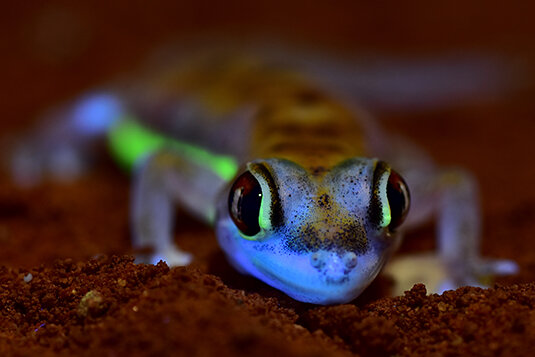
Geckos’ remarkable capability to see color at night is a product of their unique eye adaptations. These adaptations include multifocal lenses that swiftly adjust to varying light conditions, a high density of both rod and cone cells in their retinas, and a specialized layer called the tapetum lucidum. The tapetum lucidum reflects and amplifies incoming light, enhancing their night vision and color perception.
Moreover, their eyes are characterized by their large size relative to their body, enabling them to gather more available light. These evolutionary adjustments cater to their nocturnal lifestyle, making them the envy of color vision enthusiasts, as they can appreciate a spectrum of colors in the dimmest of nightscapes.
How Geckos Evolved To Seeing In The Dark?
Their journey of toward developing their exceptional night vision commenced when they boldly departed from the diurnal sleeping patterns commonly observed in their lizard kin. This pivotal divergence allowed these crepuscular geckos to seize a distinct advantage in the realm of limited nocturnal illumination.
Under the cover of the night, they began to amplify their nocturnal activities, a pivotal shift that led to the evolution of their photoreceptor cones. These cones, with remarkable ingenuity, underwent significant enhancements, ultimately bestowing upon them the extraordinary ability to discern colors even in the darkest of environments.
Further, have harnessed the power of three distinct photopigments to navigate the subtle nuances of dimly lit landscapes. These photopigments span the visual spectrum, encompassing UV, blue, and green wavelengths.
Lastly, This triad of sensory acumen furnishes geckos with a decisive edge over potential predators, establishing them as resilient survivors capable of thriving in both the great outdoors and indoor sanctuaries.
Gecko’s Night Vision: A 350-Fold Advantage Over Humans
Geckos have honed their nocturnal prowess, surpassing human night vision by a staggering 350-fold. In the cloak of darkness, they reign supreme. However, their visual acumen extends beyond just the night, as they harness the power of light during both day and night.
During their daytime slumber, they employ vertical eye slits as sentinels, warding off the potentially harmful rays of the sun. This adaptation ensures their safety and preserves their vision during their periods of inactivity.
In the spectrum of light, they thrive under various illuminations. They excel in the gentle embrace of ambient light, the mystique of UV rays, and the brilliance of sunlight itself. In essence, they possess a versatile visual toolkit, enabling them to navigate the world under diverse lighting conditions, not just in the dark.
While their adaptation to seeing in low-light conditions is undoubtedly a remarkable advantage, it’s important to note that plunging a gecko into perpetual darkness would be detrimental. These creatures rely on the light of day to uphold their circadian rhythm and overall visual health. The interplay of light and darkness is pivotal in maintaining their well-being.
Gecko Vision: Exploring Their Sensory Realm Beyond Thermal Imaging
Geckos, intriguing as they are, lack the remarkable gift of thermal vision. In their visual arsenal, the ability to perceive thermal wavelengths remains conspicuously absent. Achieving such a feat would necessitate the incorporation of additional proteins into their receptor systems, a step beyond their existing sensory capabilities.
Nevertheless, they possess their own set of fascinating adaptations. Their vertically slit eyes, reminiscent of a watchful sentinel, expand their range in the darkness. Although thermal wavelengths remain elusive to their senses, this distinctive ocular structure empowers them to navigate the night with greater precision, compensating for the absence of thermal vision.
Gecko Vision: A Specialized Marvel of Simplicity
When it comes to geckos, their vision is a unique and specialized marvel. Unlike humans, whose vision is a balance of rods and cones, they take a different approach.
In our eyes, rods excel at scotopic vision, enabling us to see in low-light conditions, while cones are responsible for perception, discernment, and discrimination of colors. Our cones come in three types: S-cones for short-wavelength sensitivity, M-cones for middle-wavelength sensitivity, and L-cones for long-wavelength sensitivity.
However, the story unfolds quite differently. They have forsaken cones entirely and instead boast transformed rods in their rather simple retinas. These specialized rods serve a dual purpose, allowing them to perceive both light and color with a finesse that rivals our own, if not surpasses it.
Why Do Geckos Need To See In The Dark?
Escape from Predators: Many animals that want to eat them are active at night. So, geckos need to see well in the dark to avoid getting caught by these predators.
Finding Food: eat insects and small creatures that are also active at night. To find their dinner, geckos need to see in the dark.
Mating: Also, often look for mates and reproduce at night. Having good night vision helps them find the right partners and have babies.
Getting Around: They are good climbers and explore different places at night. To move safely and find their way, they need to see in the dark and avoid any obstacles.
Gecko’s Colorful World: Seeing the Night in Vibrant Hues
Geckos have a colorful view of the world that doesn’t fade even in dim moonlight or pitch-black nights, which is quite different from us humans who struggle to see colors in those conditions.
Their color vision is remarkably better than ours, especially in low light. They have large cones in their eyes, which help them see with higher detail and distinguish between various colors even when it’s not very bright.
Their eyes are equipped with a special system that makes them super-sensitive to their surroundings. This unique vision, combined with their keen sense of hearing and ability to detect movement, makes them truly exceptional and fascinating pets to care for.
So, in their world, colors are always vivid, and they’re always ready for whatever comes their way, whether it’s food or an unexpected visitor like you.
Nighttime Lighting Options for Observing Your Gecko Without Disrupting Their Natural Rhythms
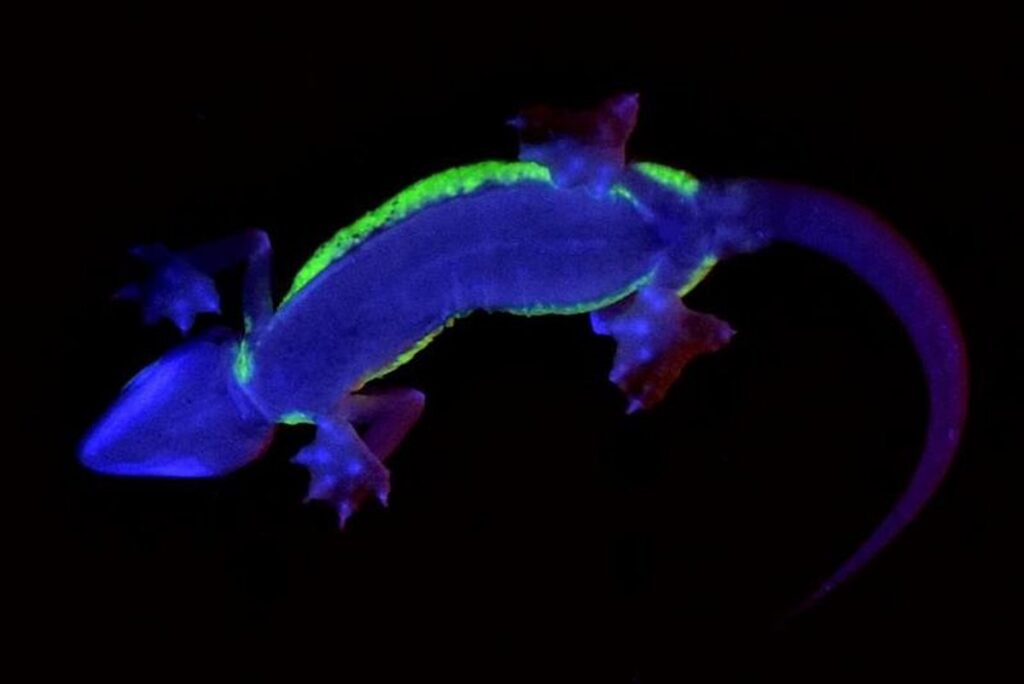
For those who wish to watch their geckos at night, here are a few options:
Night Vision Camera: A simple surveillance camera equipped with night vision capabilities can be positioned in front of the enclosure. This allows you to observe their behavior without disturbing their natural rhythm. Look for a camera with infrared HD night vision for clear surveillance.
Black Light: While it may perceive some of the light from a black light, it is considerably dimmer than daylight. Using a black light for a short period in the evening can provide an intriguing way to observe certain morphs.
Red or Blue Light: Red or blue lighting is less likely to disrupt your gecko’s circadian rhythm compared to white light, but they can still perceive it. Keep in mind that they can see color at night, so a red or blue light may impact their perception of their environment.
Also, if you choose to use lighting to observe your pet, it’s best to limit it to a couple of hours in the evening. Alternatively, consider a customizable lighting option that allows you to program sunrise, sunset, and evening modes. This way, you can mimic natural lighting transitions while still having the opportunity to observe your gecko’s behavior.
Please note that these lights do not provide heat, so if additional heat is needed, pairing them with a ceramic heat emitter is advisable.
FAQs
Why geckos can see in the dark?
Geckos have remarkable night vision, which even includes the ability to see colors. This unique vision is crucial for their nighttime activities like hunting and avoiding danger.
Their exceptional night vision is made possible by their eyes, which are distinctively bulging and patterned with metallic hues. These eyes house sensitive retinas filled with delicate sensors that enable them to see colors even in the dark.
During the day, geckos can protect their eyes from harmful sunlight by closing their vertical eye slits. This remarkable combination of adaptations makes geckos some of the world’s best night vision creatures.
Can Crested Geckos See in the Dark?
Yes, crested geckos have excellent night vision, and it’s been demonstrated through controlled tests where they excel at various nighttime activities like maneuvering, avoiding predators, and capturing prey.
As nocturnal creatures, crested geckos are well-equipped for low-light conditions. They widen their pupils at night to enhance their vision. Their eyes are remarkably sensitive, making them approximately 350 times more light-sensitive than humans. This heightened sensitivity allows them to distinguish between colors even in the dark, including blues, greens, browns, and grays.
Why Leopard Geckos See Colors in the Dark?
Geckos, including leopard geckos, can differentiate between various colors even in pitch-black darkness. Controlled tests have confirmed their ability to recognize colors like dark blue, brown, and gray in such conditions. Compared to humans, who would struggle to see beyond their immediate surroundings, geckos possess superior night vision, allowing them to perceive objects at greater distances.
Do Leopard Geckos Have Better Night Vision Than Crested Geckos?
Yes, leopard geckos have superior night vision compared to crested geckos. They have approximately 20-25% more rod cells in their eyes, which are highly sensitive to light. Additionally, leopard geckos have larger eyes, more light-sensitive cells, and an advantage in terms of the number of rods, giving them an evolutionary edge in seeing in the dark.
Do Geckos Need Light at Night?
No, geckos do not need light at night. Even when they are active during the night, they still require a regular pattern of daylight and darkness to mimic their natural circadian rhythm. It’s essential to maintain this pattern in their enclosures. If there is excessive light in the room at night, covering the gecko’s cage can help them maintain their natural rhythm.
Do Leopard Geckos Have Night Vision?
Yes, leopard geckos indeed have excellent night vision. They are crepuscular animals, meaning they are most active during dawn and dusk. Their eyes are well-adapted to low light conditions, and they have specialized adaptations like sensitive rod cells and a reflective layer called the tapetum lucidum, which enhances their night vision. This allows them to navigate, hunt, and detect movement effectively in the dark, making them well-suited to their nocturnal lifestyle.
Do geckos like the dark?
Yes, Geckos are nocturnal or crepuscular creatures, which means they are naturally adapted to low-light conditions and are most active during the night or at dawn and dusk. So, they are comfortable in the dark.
Can house geckos see in the dark?
Yes, house geckos, like many other gecko species, have specialized adaptations that allow them to see well in low-light or dark environments. They possess excellent night vision.
Does light scare geckos?
No, Geckos are generally not scared of light, but excessive or bright light can disrupt their natural behavior and circadian rhythms. It’s important to provide appropriate lighting conditions in their habitat to ensure their well-being.
Final Words
In conclusion, delving into the fascinating world of geckos and their ability to see in the dark has been an enlightening journey. As I explored their unique adaptations, from specialized retinas to tapetum lucidum, it became evident that geckos are truly masters of the night.
In addition, their exceptional night vision, allowing them to perceive colors and navigate with ease in darkness, underscores their remarkable evolutionary adaptations. Whether it’s the crested keen vision or the leopard’s heightened sensitivity to light, these creatures have honed their abilities to thrive in the shadows.
So, It’s a captivating reminder of the diversity and ingenuity of nature’s creations, offering us a glimpse into a world where darkness holds no secrets for these remarkable reptiles.

